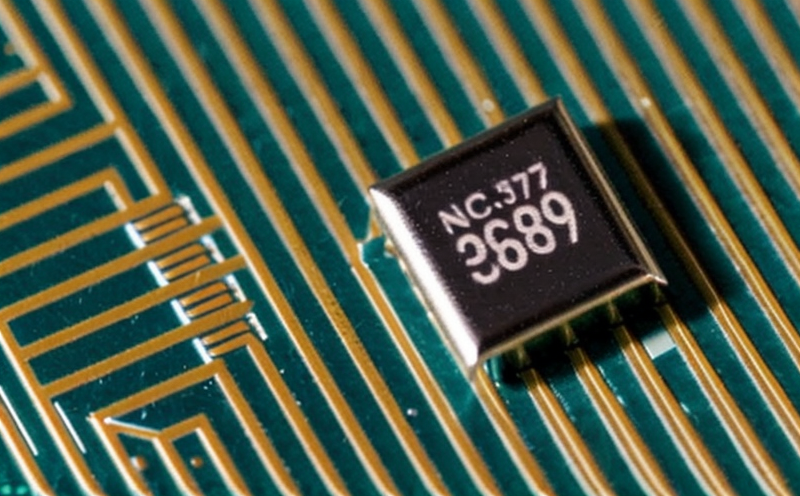IEC 60749-22 Microchip Interconnect Reliability Testing
The IEC 60749-22 standard is a critical component in ensuring the reliability and lifetime of microchips, particularly those used in high-reliability applications such as automotive, aerospace, and medical devices. This testing ensures that interconnects—those parts of the microchip responsible for transmitting electrical signals—are robust against mechanical stress, thermal cycling, and environmental factors.
The IEC 60749-22 standard defines a comprehensive set of tests aimed at assessing the durability and longevity of these interconnects. These tests are essential in preventing premature failures that can lead to costly downtime, product recalls, and safety hazards. The testing process involves simulating real-world conditions that microchips might encounter during their operational lifecycle.
The key parameters tested under this standard include mechanical stress (such as bending and flexing), thermal cycling, vibration, and exposure to harsh environmental conditions like humidity, temperature extremes, and chemical attacks. By subjecting the interconnects to these stresses in a controlled laboratory environment, engineers can identify potential weaknesses early on.
For instance, automotive applications often require microchips capable of withstanding extreme temperatures ranging from -40°C to 150°C. Similarly, aerospace components must endure rapid changes in altitude and temperature fluctuations. The IEC 60749-22 standard ensures that these critical parts are tested under conditions that mimic actual usage scenarios.
The testing procedure typically involves preparing the microchips by cleaning them with appropriate solvents and ensuring they are free from contamination. Once prepared, the interconnects undergo a series of mechanical and environmental stress tests designed to simulate real-world operational conditions. The results provide valuable insights into the performance and reliability of the microchip under various stressors.
One notable aspect of IEC 60749-22 testing is its emphasis on statistical analysis. Engineers use this data to predict how long a particular batch or model of microchips might last in real-world applications. This predictive capability allows manufacturers and designers to make informed decisions regarding product design, materials selection, and manufacturing processes.
- Thermal Cycling: This involves exposing the interconnects to repeated cycles of temperature changes to simulate the operational environment they will encounter.
- Vibration Testing: This simulates the effects of mechanical vibration on the microchip's performance over time.
- Humidity Exposure: This tests the interconnects' resistance to moisture, which is crucial for ensuring long-term reliability in various applications.
The standard also includes acceptance criteria that define when a batch of microchips passes or fails. These criteria are based on predefined thresholds for failure rates and performance metrics such as signal integrity and power consumption. Compliance with these standards ensures that the products meet the stringent quality expectations set by industry regulators.
Benefits
The primary benefit of IEC 60749-22 testing lies in its ability to enhance product reliability and extend the lifetime of microchips. By identifying potential weaknesses early, manufacturers can address these issues before production, reducing the risk of costly failures once the products reach the market.
From a safety perspective, ensuring the reliability of critical components like those used in medical devices or aerospace applications is paramount. These tests help prevent accidents and ensure that the technology performs as expected under all conditions. Additionally, compliance with international standards like IEC 60749-22 can enhance brand reputation and market competitiveness.
For R&D engineers, this testing provides a robust framework for innovation. It allows them to refine designs, optimize materials, and improve manufacturing processes based on empirical data from rigorous tests. This iterative process ultimately leads to more efficient and effective product development cycles.
Compliance with these standards also simplifies the regulatory approval process, which can be a significant advantage in highly regulated industries such as automotive and aerospace. It ensures that products meet stringent international quality assurance criteria, streamlining certification procedures.
Industry Applications
The IEC 60749-22 standard finds extensive application in various industries where the reliability and longevity of microchips are paramount. Some key sectors include:
- Aerospace: Ensuring that avionics systems can operate reliably under extreme environmental conditions.
- Automotive: Enhancing the durability and safety of electronic control units in vehicles.
- Medical Devices: Providing assurance of product reliability for life-critical components used in medical devices.
- Rail Transportation: Improving the performance and longevity of electronics used in train control systems.
In each of these sectors, microchips play a crucial role in ensuring safety and efficiency. The stringent testing provided by IEC 60749-22 helps to maintain high standards across all aspects of the technology's performance.
Environmental and Sustainability Contributions
The thorough testing of microchip interconnects under IEC 60749-22 helps reduce waste by identifying potential failures early. This minimizes the need for post-manufacturing replacements, thereby reducing material usage and associated environmental impacts.
By ensuring product longevity, this testing also reduces the frequency of product recalls and returns, which can lead to significant cost savings and a better reputation among consumers.
The standard's emphasis on robust design and materials selection contributes to more sustainable manufacturing practices. It encourages the use of environmentally friendly materials that are easier to recycle or repurpose at the end of their lifecycle.





